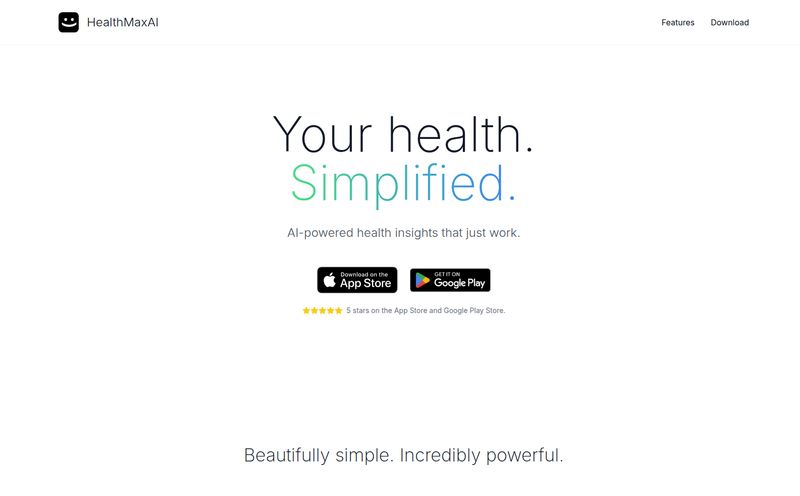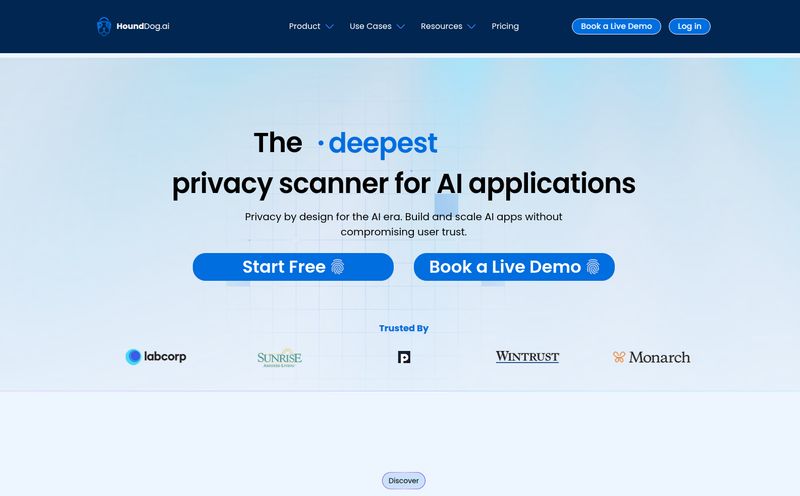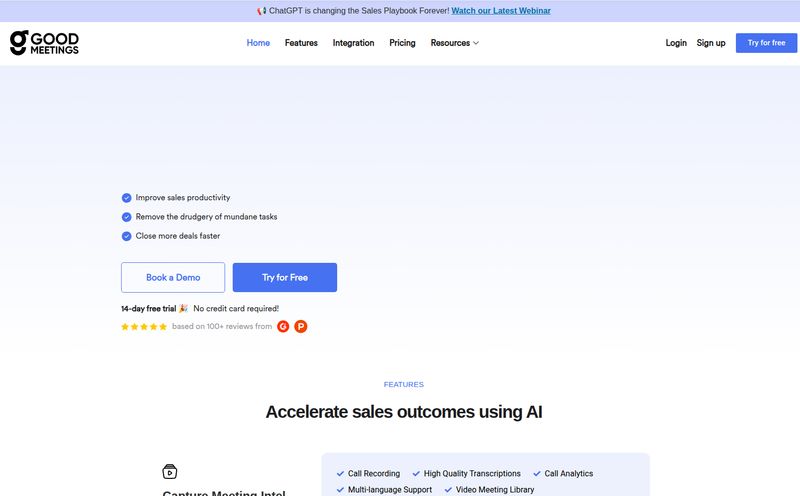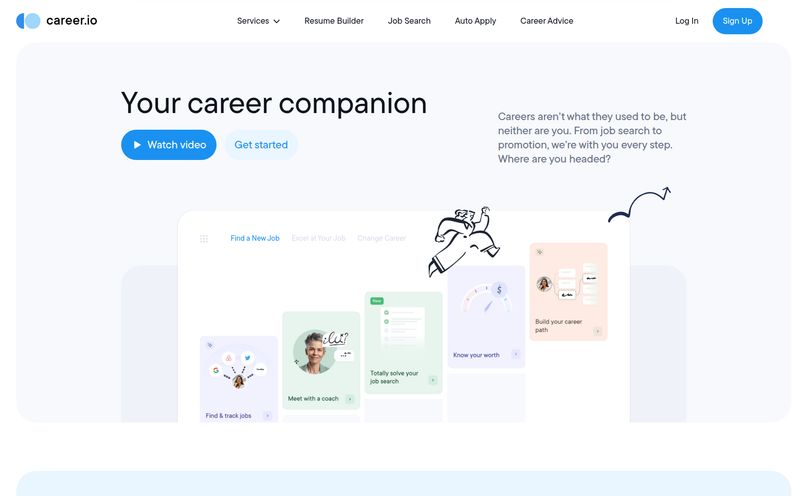When I first stumbled upon MuscleMax AI, my inner cynic, honed by years of sifting through SEO fads and marketing fluff, let out a loud groan. Another AI app promising to revolutionize… well, everything? It feels like you can’t even buy a coffee these days without an algorithm analyzing your bean preference. But then I looked closer.
This wasn't about generating another soulless article or a weird piece of art. This was about the gym. My sanctuary. It promised to do something that every single one of us who lifts has struggled with: give an honest, objective look at our physique. No more weird locker room lighting that makes you look like a Greek god one day and a deflated balloon the next. No more relying on your significant other who lovingly says “you look great!” when you’re fishing for real critique on your lagging calves.
MuscleMax AI claims to be an AI-powered body scanner that rates your muscle groups and gives you workout advice. A digital gym bro in your pocket, if you will. But does it work, or is it just more tech noise? Let's get into it.
So, What Exactly Is MuscleMax AI?
At its core, MuscleMax AI is a fitness app for iOS that uses artificial intelligence to analyze your body. The process is deceptively simple. You take a front and a back photo of your torso (shirtless, we’ll get to that bit later), and the app’s AI gets to work. It’s not just a fancy filter. It breaks down your physique muscle group by muscle group—chest, shoulders, back, arms, you name it—and provides detailed ratings.
Think of it like a report card for your muscles. Instead of just looking in the mirror and thinking, “I guess my shoulders could be bigger,” the app aims to give you concrete data. It’s designed for the gym enthusiast, the bodybuilder, or frankly, anyone who’s a bit of a data nerd and wants to take their training to the next level.
The whole idea is to move past subjective “progress pics” and get a more consistent measure of your hard work.
How the AI Muscle Analysis Actually Works
This is where my curiosity really piqued. It’s one thing to have a cool concept, but the execution is everything. From what I can gather, the process is straightforward, but it has some important caveats.
The Scanning Process: Getting Your Kit Off
Alright, let’s address the elephant in the room. To use MuscleMax AI, you have to provide shirtless photos. The AI needs to clearly see your musculature, your insertions, and the overall shape of each body part to do its job. For some, this is a non-issue. If you’re used to taking progress pictures, it’s just another Tuesday. For others, this might be a dealbreaker, and that's perfectly fine.
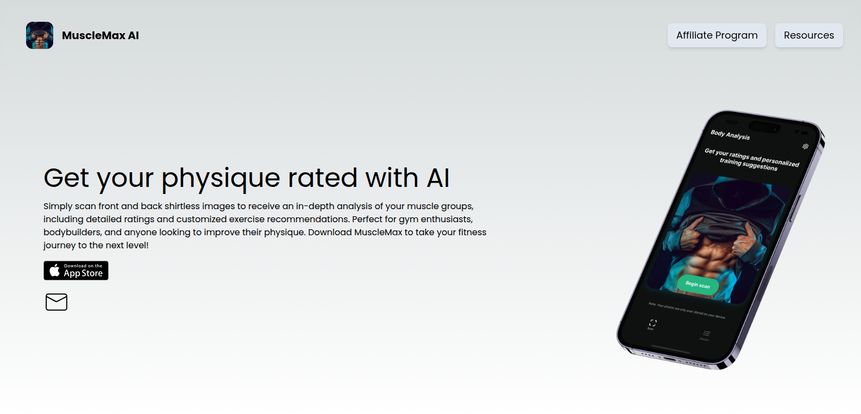
Visit MuscleMax AI
The app also stresses that image quality matters. This isn't surprising to anyone who knows a little about computer vision. Poor lighting, weird angles, or a blurry photo will throw off the analysis. For best results, you need to treat it like a proper progress photo: good, consistent lighting and clear, straight-on angles.
What the AI Report Card Tells You
After the scan, you get your results. This is the real meat and potatoes of the app. It provides ratings for your different muscle groups. This could be a game-changer for identifying weak points you might be blind to. We all have our favorite “mirror muscles” we train religiously (looking at you, biceps), but what about your rhomboids or your serratus anterior? The AI doesn't have favorites. It just sees the data.
This objective feedback loop is probably the most powerful feature. It helps you answer the question, “Is what I’m doing in the gym actually working?”
Beyond the Ratings: Getting a Custom Workout Plan
Getting a score is one thing, but knowing what to do with it is another. A doctor telling you that your cholesterol is high isn’t very helpful without a plan. MuscleMax AI seems to understand this. A huge part of its appeal is that it doesn’t just rate you; it gives you customized exercise recommendations based on the analysis.
If the AI determines your triceps are lagging behind your biceps, it might suggest specific exercises to bring them up. If your upper chest is a weak point, your plan will likely reflect that. This is a massive step up from grabbing a generic workout plan off a website. It’s a move toward truly personalized training, which used to be the exclusive domain of high-priced personal trainers.
The Good, The Bad, and The Shirtless
No tool is perfect. After digging in, here’s my breakdown of what shines and what might need a bit of a polish.
What I Really Think is Great
The potential for objective progress tracking is phenomenal. The scale can lie, the mirror can deceive, but data is data. Seeing your back rating go from a 6.5 to a 7.2 over three months is the kind of motivation that can push you through a tough plateau. It gamifies your physique development. I also love the customized exercise recommendations. It helps eliminate the guesswork that plagues so many people in the gym. It’s a smart tool for anyone serious about building a balanced, symmetrical physique.
Potential Sticking Points
The most obvious hurdle is the shirtless image requirement. Privacy and personal comfort are big factors, and you have to be okay with uploading these images to their system. Secondly, the accuracy is heavily dependent on image quality. If you take your pictures in a dimly lit bathroom with your phone shaking, you can’t expect a precise analysis. This user-dependent variable means the results might have some margin of error. Some people might also not respond well to being numerically 'rated'. Fitness is a mental game as much as a physical one, and for some, seeing a low score could be demotivating rather than inspiring.
Who Is This Fitness App Actually For?
So, should everyone with an iPhone download this? Probably not. If you’re a casual gym-goer who just wants to stay active, this is likely overkill. But if you fall into one of these camps, you should pay attention:
- The Aspiring or Competing Bodybuilder: This is a no-brainer. Getting objective feedback on symmetry and development is critical for competition.
- The Data-Driven Lifter: If you track your macros, your progressive overload, and your sleep, this is the next logical data point to add to your spreadsheet.
- The Person Stuck on a Plateau: If you’ve been training hard for years but feel like you’re spinning your wheels, an objective eye could reveal the weak link you've been missing.
It’s a specialized tool for people with specific goals. It's less of a general fitness app like MyFitnessPal and more of a precision instrument.
The Million-Dollar Question: What's the Price?
Here’s the rub. As of writing this, the MuscleMax AI website and App Store presence are a bit coy about the pricing. There’s no clear pricing page. This usually points to one of a few models: a one-time purchase fee in the App Store, a recurring subscription, or a freemium model where basic scans are free and detailed analysis or workout plans are behind a paywall.
Personally, I'd hope for a model that lets you try before you buy. A free initial scan would be a great way to showcase the app's power. For now, you’ll have to check the App Store directly for the most current pricing information.
Comparing MuscleMax AI to Traditional Methods
How does this stack up against the old ways? Well, it's more objective than the mirror and more convenient than hiring a coach just for physique assessments. It's certainly cheaper and more accessible than a clinical DEXA scan, which provides body fat and bone density information but doesn't offer the same kind of specific muscle group analysis or workout reccomendations. It occupies a really interesting middle ground—providing advanced-level analytics at, presumably, a consumer-level price point.
Frequently Asked Questions about MuscleMax AI
- Is MuscleMax AI accurate?
- Its accuracy is closely tied to the quality of the photos you provide. With consistent lighting and angles, it can provide a reliable baseline for tracking your personal progress over time, which is its main strength.
- Do I absolutely have to be shirtless?
- Yes. The AI needs an unobstructed view of your musculature to perform the analysis. A shirt would block all the necessary visual information.
- Are my photos and data private?
- This is a crucial question for any app. It's always best practice to read the app's specific privacy policy on the App Store before downloading to understand how your data is handled.
- Is MuscleMax AI available on Android?
- Currently, the website only promotes a link to the Apple App Store, suggesting it is an iOS-only application for now. An Android version could be in the works, but there's no official word.
- Can this app replace my personal trainer?
- No. An AI can give you data and workout suggestions, but it can't watch your form, adjust for daily fatigue, or provide the accountability and holistic guidance of a human expert. Think of it as a powerful tool for you and your trainer to use, not a replacement.
- What kinds of exercises does it recommend?
- The recommendations are customized to target the muscle groups the AI identifies as needing improvement. You can expect a mix of classic compound and isolation movements you’d find in any effective bodybuilding program.
Final Verdict: An AI Spotter for Your Physique?
MuscleMax AI is a fascinating piece of tech that sits at the intersection of fitness and data science. It’s not a magic bullet. It won’t lift the weights for you. But it does offer something genuinely valuable: a new, objective way to look at your progress and tailor your training with a level of precision that was once hard to come by.
For the dedicated lifter tired of the guesswork, I think it’s absolutely worth a look. It could be the very thing that helps you identify your muscular weak points and finally build that well-rounded, aesthetic physique you’ve been working so hard for. It's a sign of the times, for sure, and in this case, I think it's a pretty cool one.
Reference and Sources
- MuscleMax AI Official Website: Information sourced directly from the landing page.
- MuscleMax AI on the App Store: https://apps.apple.com/us/app/musclemax-ai-physique-rater/id6499318356
